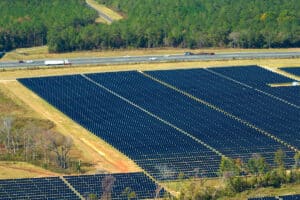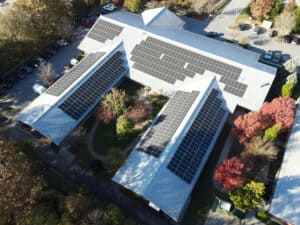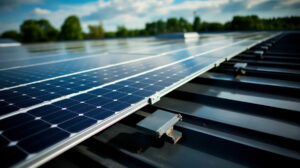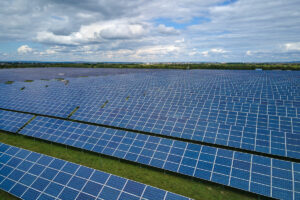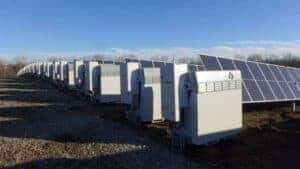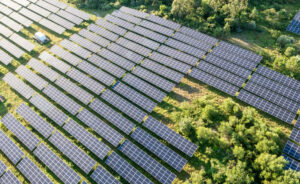The geothermal heat pump is a highly efficient renewable energy technology that is gaining wide acceptance for commercial buildings. Although the geothermal heat pump has been around since the 1940s, it’s growing quickly as people are capitalizing on the savings a geothermal heat pump can provide. According to the Geothermal Exchange Organization, ground source heat pumps for heating and cooling use 75% less energy than traditional heating and cooling systems.
How a Geothermal Heat Pump Works
Before we jump into who should consider geothermal heat pumps, let’s understand first how they work.
Unlike outdoor temperatures, the underground temperature, especially 4 feet below the earth’s surface, remains relatively constant all year round. A geothermal heating and cooling system, typically consisting of an indoor unity and a buried earth loop, capitalizes on these constant temperatures to provide free energy. The geothermal heat pump takes advantage of this by transferring heat stored in the earth or in groundwater into a building during the winter, and transferring it out of the building and back into the ground during the summer. In short, the ground acts as a heat source in the winter and a heat sink in the summer.
5 Questions to Consider Before Installing a Geothermal Heat Pump
Now that we established how a geothermal heat pump works, what questions should your business or non-profit organization ask yourself before investing in this technology? Consider these 5 questions:
1. How much space does your facility have?
Do you have a large parking lot or open land for a geothermal system? On average, a geothermal heat pump system can take up to several hundred feet of land underground to over one thousand feet of land underground depending on your energy needs. If you are unsure if your space is enough, contact us!
2. Do you have high heating and cooling costs?
Heating and cooling costs can be steep for larger facilities with refrigerated areas, cooking areas, or heavy machinery. If your facility isn’t happy with your current heating and cooling costs, investing in a geothermal heat pump system could be your solution.
3. Is your HVAC system outdated?
When was the last time your HVAC system was replaced? If it’s over 15 to 20 years ago then it may be time to consider a new one. An old HVAC system could be costing your organization a lot of money per month. Replacing those and integrating a geothermal heat pump could increase efficiency substantially. For more information on if your commercial HVAC system has reached its end, check out our blog post, “How Long Does a Commercial HVAC System Last?”.
4. What is the climate of your city like?
According to the Office of Energy Efficiency and Renewable Energy, geothermal heat pumps can operate in any climate. Although this is the case, they are most effective in climates with extreme temperatures or climates that fluctuate between extreme temperatures.
If your facility is in a climate that falls into this category, a geothermal heat pump system will allow you to have a good all-around solution to normalize your facility’s heating and cooling needs. For example, in an incredibly hot environment, the air pumped from the underground will likely get you to 90% of your air comfort level. The last ten percent will be achieved from an HVAC system but will cost much less than using 100% of the air from the HVAC system.
For More Information
For more helpful information related to geothermal heat pumps or other energy systems, check out some of these blog posts.
- What is Geothermal Energy Storage?
- How Long do Commercial HVAC Systems Last?
- How Investment Tax Credit Can Fund an Energy Project
If you are interested in a geothermal heat pump system or funding for an energy project, contact us!

